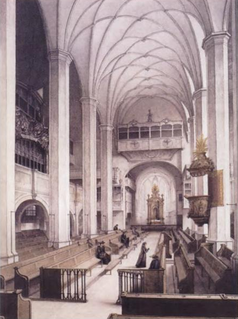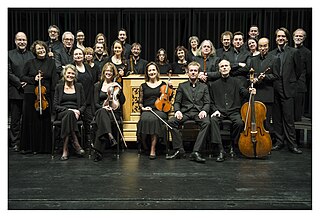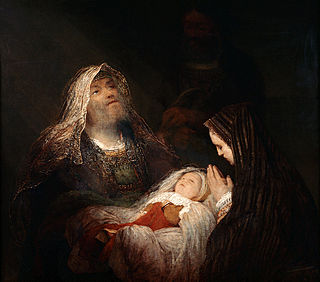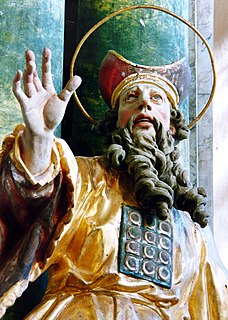Related Research Articles

Johann Sebastian Bach composed the church cantata Gott soll allein mein Herze haben, BWV 169, a solo cantata for an alto soloist, in Leipzig for the 18th Sunday after Trinity, and first performed it on 20 October 1726.

Peter Schreier was a German tenor in opera, concert and lied, and a conductor. He was regarded as one of the leading lyric tenors of the 20th century.

Collegium Vocale Gent is a Belgian musical ensemble of vocalists and supporting instrumentalists, founded by Philippe Herreweghe. The group is dedicated to historically informed performance.

Ich habe genug, BWV 82, is a church cantata by Johann Sebastian Bach. He composed the solo cantata for bass in Leipzig in 1727 for the Feast Mariae Reinigung and first performed it on 2 February 1727. In a version for soprano, BWV 82a, possibly first performed in 1731, the part of the obbligato oboe is replaced by a flute. Part of the music appears in the Notebook for Anna Magdalena Bach.
The Juno Award for "Classical Album of the Year" has been awarded since 1994, as recognition each year for the best vocal classical music album in Canada.
Joshua Rifkin is an American conductor, keyboard player, and musicologist, currently a Professor of Music at Boston University. As a performer he has recorded music by composers from Antoine Busnois to Silvestre Revueltas, and as a scholar has published research on composers from the Renaissance to the 20th century. He is famed among classical musicians and aficionados for his increasingly influential theory that most of Bach's choral works were sung with only one singer per choral line. Rifkin argued: "So long as we define 'chorus' in the conventional modern sense, then Bach's chorus, with few exceptions, simply did not exist." He is best known by the general public, however, for having played a central role in the ragtime revival in the 1970s, with the three albums he recorded of Scott Joplin's works for Nonesuch Records.
Konrad Junghänel is a German lutenist and conductor in the field of historically informed performance, the founder and director of the vocal ensemble Cantus Cölln.

The Easter Oratorio, BWV 249, is an oratorio by Johann Sebastian Bach, beginning with Kommt, eilet und laufet. Bach composed it in Leipzig and first performed it on 1 April 1725.
Notable recordings of Johann Sebastian Bach's St Matthew Passion (Matthäus-Passion) are shown below in a sortable table.
Klaus Mertens is a German bass and bass-baritone singer who is known especially for his interpretation of the complete works of Johann Sebastian Bach for bass voice.
The listing shows recordings of the Mass in B minor, BWV 232, by Johann Sebastian Bach. The selection is taken from the 281 recordings listed on the Bach Cantatas Website as of 2018, beginning with the first recording by a symphony orchestra and choir to match, conducted by Albert Coates. Beginning in the late 1960s, historically informed performances paved the way for recordings with smaller groups, boys choirs and ensembles playing period instruments, and eventually to recordings using the one-voice-on-a-vocal-part scoring first argued for by Joshua Rifkin in 1982.
Recordings of the St John Passion are shown as a sortable table of selected notable recordings of Johann Sebastian Bach's St John Passion, BWV 245. The selection is taken from the 241 recordings listed on bach-cantatas as of 2015.

Johann Sebastian Bach composed the church cantata Ihr Menschen, rühmet Gottes Liebe, BWV 167 in Leipzig for the Feast of St. John the Baptist and first performed it on 24 June 1723. It is part of his first cantata cycle in Leipzig.

Liebster Immanuel, Herzog der Frommen, BWV 123, is a church cantata by Johann Sebastian Bach. He composed the chorale cantata in Leipzig for Epiphany and first performed it on 6 January 1725. It is based on the hymn by Ahasverus Fritsch (1679).

Gotthold Schwarz is a German bass-baritone singer and conductor. Based in Leipzig, he started as a member of the Thomanerchor and has conducted the Gewandhausorchester. He is the 17th Thomaskantor after Johann Sebastian Bach.
Das neugeborne Kindelein, BWV 122, is a church cantata by Johann Sebastian Bach. Bach composed the chorale cantata in six movements in Leipzig for the Sunday after Christmas and first performed it on 31 December 1724.
Martin Krumbiegel is a German classical tenor, conductor and musicologist. A member of the Thomanerchor as a boy, he is mostly active in oratorios, cantatas and vocal chamber music of the 17th and 18th century.
Emily Van Evera is an American soprano who specializes in early music and Baroque music in historically informed performance.

Kieth Engen was an American operatic bass who was a member of Munich's Bavarian State Opera for decades. Although his career was based in Munich, he appeared internationally as a guest singer at major opera houses and festivals and performed and recorded many of Bach's Passion oratorios and cantatas, primarily with the conductor Karl Richter. He was born Keith Sheldon Engen in Frazee, Minnesota, and died in Murnau am Staffelsee, Germany at the age of 79. He was given the title of Kammersänger in 1962 and was a recipient of the Bavarian Order of Merit. In the mid-1950s he also had a brief parallel career as a pop singer under the pseudonym Stan Oliver.
This is a list of recordings of Bach's Wie schön leuchtet der Morgenstern, BWV 1, a chorale cantata for the Annunciation, celebrated on 25 March. Bach composed the cantata in Leipzig in 1725, as part of his second cantata cycle.
References
- ↑ "Les Délices & Quire Cleveland: a conversation with guest conductor Eric Milnes". clevelandclassical.com. 18 December 2018. Retrieved 29 April 2019.
- ↑ "Eric Milnes". Challenge Records . Retrieved 29 April 2019.
- ↑ Pettitt, Stephen (20 January 2012). "The Songs of Solomon Vol. 2:Holiday and Festive Music". classical-music.com. Retrieved 2 May 2019.
- ↑ "Eric J. Milnes & Montréal Baroque / Bach Cantatas & Other Vocal Works". Bach Cantatas Website. 2018. Retrieved 29 April 2019.
- ↑ Wigmore, Richard (18 December 2018). "JS BACH Cantatas Nos 72, 81, 155 & 156". Gramophone . Retrieved 29 April 2019.
- ↑ Vernier, David. "J.S. Bach: Cantatas for Mary/Montréal Baroque". classicstoday.com. Retrieved 2 May 2019.